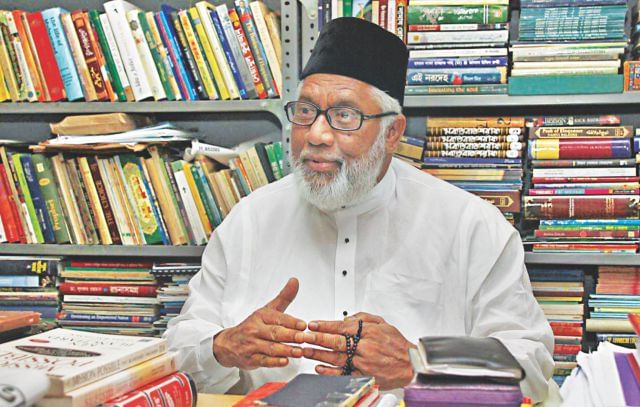Lower interest rates to expedite business
Banks must reduce the abnormally high loan interest rates to facilitate genuine businesses, said the chairman of a conglomerate in Chittagong.
In an interview with The Daily Star, Sufi Mohammed Mizanur Rahman, chairman of PHP Group, said he was vexed by the culture of default for which the genuine entrepreneurs must pay a heavy price.
The banks and business community must also share the blame for this situation, while businesses are unable to carry out day-to-day activities and contribute to the economy for the high rate of interest, he added.
“Had the banks been more effective in monitoring the loans, the amount owed to them could significantly be reduced and entrepreneurs could get loans at a rate of five percent instead of 16 percent-17 percent.”
Describing his own experience, Rahman said it is crucial that businessmen build a rapport with the banks and earn their confidence.
Recalling the early days of his career, Rahman said he joined National Bank of Pakistan (now Sonali Bank) in 1965 after passing his HSC examinations and later moved to Eastern Mercantile Bank (now Pubali Bank) after graduating and obtaining a diploma in banking.
After Bangladesh's liberation, Rahman felt there was a vacuum in entrepreneurship. His father, Sufi Mohammed Daemuddin, encouraged him to get into business and told him: “If you know the art of business, money will run after you.”
His banking career helped in his first business venture when he imported tyres from Japan. One could, in the early 1970s, import several items against an 'export bonus scheme' and if the banks allowed, it could finance 100 percent of such schemes.
In 1972, Rahman received financing worth $4,000 and churned profits three times more.
He then imported vacuum flasks from China and was able to set up an office in Khatunganj with two other staff.
He later started a wholesale business, alongside his import business, in Maulvibazar, Dhaka, mostly selling edible products bought from Chittagong.
In the early 1980s, when there was a depression in the trading sector, Rahman started a ship-breaking plant.
“I bought a 5,000-tonne capacity ship made in Germany called 'Ocean Ace' in 1982. This project fetched me huge profits and I set up a re-rolling mill to manufacture MS rods later the same year.”
Rahman feels that project was the turning point in his career as it raked in a profit of Tk 1.5 crore in 1982.
In 1985, Rahman set up an edible oil refinery; and in 1988, his plant in Madhabdi near Narayanganj started producing corrugated iron sheets. Soon, he was able to set up another plant in the same area and expand his office in Khatunganj with 25 employees.
His success story continued to become PHP Group with 18 industrial and trading units, including CI sheet mills, cold roll coil mills, rubber plants, float glass manufacturing, fisheries, cotton mills, stocks and securities and properties.
The group chairman said he is now proud to be able to generate employment for about 11,000 people in his group, which had a turnover of nearly Tk 4,000 crore last year.
“We have also ventured into an agro-based business, and to this end, the group has purchased 100 acres of land in Dinajpur producing mainly fruits, like mangoes and lychee.”
The group also has a rubber plant in Baishari, Bandarban, which is expected to have a total output of 300 tonnes this year. With acquisition of an additional garden, it would be able to produce 600 tonnes next year.
On expansion plans, the chairman said they started a new project producing advanced grade MS rods, called TMT Bar 500, and purchased a plant that produces 80 tonnes a day.
“We revamped this plant and increased the capacity to 300 tonnes a day.”
His latest project is to produce diesel, octane, petroleum and kerosene in a plant that they set up in Barabkunda in Sitakunda upazilla. The company, PHP Refinery Ltd, would obtain raw materials from the government in the form of residue from its various gas-fields and supply the finished products to the government.
“This plant is expected to go into production in April with an expected total output of 40,000 tonnes a year.” The plant would also employ 500 people and fetch annual revenue to the tune of Tk 300 crore.
PHP Group also forayed into exports with rubber, glass and steel to India, Sri Lanka, Pakistan, Myanmar, some African countries, Singapore and occasionally to the Philippines.
Rahman said the group's export last fiscal year exceeded $65 million.
On corporate social responsibility, Rahman said in 1996, the group founded Alhaj Sufi Daemuddin Hospital at Kanchan, Rupganj, Narayanganj, where he was born.
This non-profit hospital provides low cost medical services to the needy. “We also plan to establish a medical university and a cancer research institute in the area.”
In the field of education, PHP Group assisted the University of Information Technology and Sciences to make donations in excess of Tk 300 crore.
Various schemes for employee welfare and cultural activities are also encouraged in the group, said Rahman.
PHP Plantation is one project that the group chairman is proud about. The group owns about 120 acres of land in Barabkunda in the Sitakunda Forest range.
Plantation started in July 2005 and Rahman feels that planting trees can subsequently improve the quality of the environment.
“Private initiatives are required to improve the environment and PHP Group, keeping this in mind, has decided to invest in this plantation project to ensure a safe environment for our future generations.”
On his principles, Rahman said he is involved with one of the largest charitable organisations, Rotary International, and both in his private and business life, he strives to follow its motto -- Service Above Self.


 For all latest news, follow The Daily Star's Google News channel.
For all latest news, follow The Daily Star's Google News channel. 



Comments